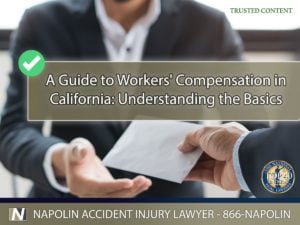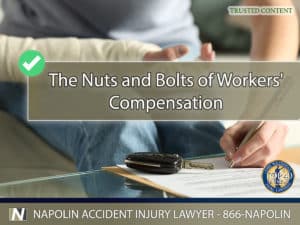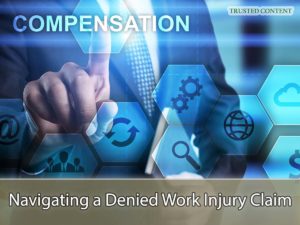A Guide to Workers’ Compensation in California: Understanding the Basics

A Guide to Workers' Compensation in California Understanding the Basics
A Guide to Workers' Compensation in California Understanding the Basics – If you're an employee working in the Golden State, or if you're an employer, there's a good chance you've heard about Workers' Compensation. This is a big deal, and it's essential to know what it is, why it's important, and how it works. But don't worry if this all sounds a bit complicated. I'm here to explain it to you in simple, easy-to-understand terms.
What is Workers' Compensation?
First off, let's get clear on what we're talking about. Workers' Compensation is a system that's been put in place to protect workers, like you and me, if we get injured or sick because of our job. It's a law in California that most employers must have Workers' Compensation insurance.
Picture this: You're working at a construction site and accidentally drop a heavy brick on your foot. Ouch! Workers' Compensation steps in here. It helps you cover medical bills, lost wages from time off work, and potentially more if you can't go back to your old job. It's a safety net for workers!
The Nuts and Bolts of Workers' Compensation

The Nuts and Bolts of Workers' Compensation
Now, let's dig a little deeper. Workers' Compensation isn't a one-size-fits-all deal. It changes depending on the injury or illness, and the circumstances around it. There are a few different benefits you might be eligible for.
Medical Care
This is the first port of call. If you're injured on the job, Workers' Compensation covers all necessary medical care. That means doctor's appointments, hospital visits, medications, and even travel expenses for medical appointments. All of this, with no out-of-pocket costs to you.
Temporary Disability Benefits
Let's say that brick injury means you can't work for a while. You're going to need some money to cover your regular expenses, right? That's where Temporary Disability Benefits come in. They replace some of your lost wages while you're off work recovering.
Permanent Disability Benefits
Sometimes, an injury or illness might mean you can't return to your old job. If your injury permanently affects your ability to work, you may be eligible for Permanent Disability Benefits. These benefits help compensate for your lost future earnings.
Supplemental Job Displacement Benefits
In some cases, you might need to switch jobs after your injury. If your employer doesn't offer modified or alternative work, you could receive a voucher for retraining or skill enhancement. It's like a golden ticket to a new career!
Death Benefits
Finally, in the unfortunate event of a worker's death due to a job-related injury or illness, Workers' Compensation provides benefits to the worker's dependents.
The Process of California Workers' Compensation

The Process of California Workers' Compensation
Knowing the benefits, you're probably wondering, “How do I actually get these benefits if I'm injured?” Well, there's a process in place for that.
- Report the Injury: The first step is to report the injury or illness to your employer. It's essential to do this as soon as possible. The law gives you 30 days, but sooner is always better.
- Seek Medical Help: Next, you should seek medical help immediately. Remember, Workers' Compensation covers this.
- File a Claim: After reporting the injury to your employer, they will provide you with a claim form. Fill this out and return it to them ASAP.
- Claim Review: After you submit the claim form, your employer's Workers' Compensation insurance company will review it. They'll decide if your claim is accepted or denied.
Receive Benefits: If your claim is accepted, you'll start receiving benefits. If it's denied, there's an appeal process you can follow.
Navigating a Denied Work Injury Claim

Navigating a Denied Work Injury Claim
Being denied Workers' Compensation can feel like a big setback, but it's not the end of the road. If this happens to you, here's what you can do:
- Understand Why: The first step is to understand why your claim was denied. The insurance company should provide a reason. Maybe it's a simple paperwork error, or perhaps they need more evidence that your injury is work-related.
- Collect Evidence: If the insurance company needs more proof, now's the time to gather it. This could be medical records, statements from coworkers, or even photos of your workplace.
- File an Appeal: Once you've got your evidence, you can file an appeal with the Workers' Compensation Appeals Board. This is your chance to argue your case and hopefully get the decision reversed.
The Importance of a Workers' Compensation Attorney
When you're dealing with a Workers' Compensation claim, it can be helpful to have an expert on your side. A Workers' Compensation attorney can guide you through the process, help gather evidence, and even represent you if you need to appeal a denied claim.
Safety First!
While Workers' Compensation is there to protect us if we get injured on the job, it's always better to avoid work injuries in the first place. Always follow safety procedures at work, use protective equipment, and don't be afraid to speak up if you see something unsafe.
The Wrap Up: A Guide to Workers' Compensation in California Understanding the Basics
So, there you have it! That's the lowdown on Workers' Compensation in California. It's a vital system that provides support for workers who get injured or sick because of their job.
Remember, if you're injured, report it, seek medical help, and file a claim as soon as possible. And if things don't go smoothly, don't be afraid to seek help, whether that's from an attorney or by appealing a denied claim. Stay safe out there, and know that Workers' Compensation has got your back if something does go wrong.
Frequently Asked Questions about Workers' Compensation
Do All Employers Offer Workers' Compensation?
In California, almost all employers are required by law to have Workers' Compensation insurance, even if they only have one employee. There are very few exceptions, so chances are, your employer should have it.
What if My Employer Doesn’t Have Workers' Compensation Insurance?
If your employer doesn’t have Workers' Compensation insurance, you may still have options. You could file a personal injury lawsuit against your employer, or you might be eligible for benefits from the Uninsured Employers Benefit Trust Fund (UEBTF) in California.
Can I Be Fired for Filing a Workers' Compensation Claim?
Absolutely not! It's against the law for an employer to fire, discriminate, or retaliate against you for filing a Workers' Compensation claim. If you feel this has happened to you, reach out to a Workers' Compensation attorney or the Division of Workers' Compensation (DWC) immediately.
What if I'm Injured, but It's My Fault?
Even if an accident at work was your fault, you're generally still covered by Workers' Compensation. It's a no-fault system, meaning that benefits are paid without regard to who caused the job-related accident.
Workers' Compensation: Your Right, Your Protection
Alright, we've covered a lot of ground, but it's all crucial information that every worker should know. Workers' Compensation is not just an abstract concept or a line item on your pay stub. It's a fundamental right that offers financial protection and peace of mind to you as a worker.
Just remember, if you're ever injured or fall sick because of your job, don't be shy about claiming what's rightfully yours. Reporting the injury promptly, seeking immediate medical attention, and correctly filing your claim are key steps in the process.
But above all, remember that the best case scenario is never to need Workers' Compensation in the first place. So, always prioritize safety at work. Let's stay safe out there, folks!
And finally, if the process seems overwhelming or if your claim gets denied, don't hesitate to seek professional help. Workers' Compensation attorneys are there to guide you through the maze and fight for your rights.
How Napolin Accident Injury Lawyer Can Help You
Navigating the Workers' Compensation process can feel like trying to find your way through a maze. But don't worry, that's where Napolin Accident Injury Lawyer comes in.
Expertise in Workers' Compensation
The team at Napolin Law has a wealth of experience in Workers' Compensation law. They understand the ins and outs of the system and can provide you with the expert advice you need to secure your benefits. With their team of experienced attorneys, they offer personalized attention to each case, ensuring that your unique needs are met.
Fighting for Your Rights
If your claim gets denied, don't panic. The Napolin team knows how to fight for your rights. They'll help gather the necessary evidence, guide you through the appeals process, and represent you in hearings. They've successfully handled many Workers' Compensation cases and know what it takes to get a decision reversed.
A Holistic Approach
At Napolin Law, they understand that getting injured or sick because of your job affects more than just your paycheck. It can impact your health, your family, and your future. That's why they take a holistic approach to Workers' Compensation cases. They don't just focus on getting you your benefits; they also help you get the medical care you need and support you in your recovery.
The Workers' Compensation process might seem daunting, but with the right help, you can navigate it successfully. If you're ever injured on the job, remember that you're not alone. The Napolin Accident Injury Lawyer team is here to help you get the benefits you're entitled to and the support you need.
- A Guide on Red Light Auto Accidents in California - August 14, 2024
- Self-Representing in a California Personal Injury Claim - August 13, 2024
- Common Sources of Distraction for Drivers in California - August 13, 2024
